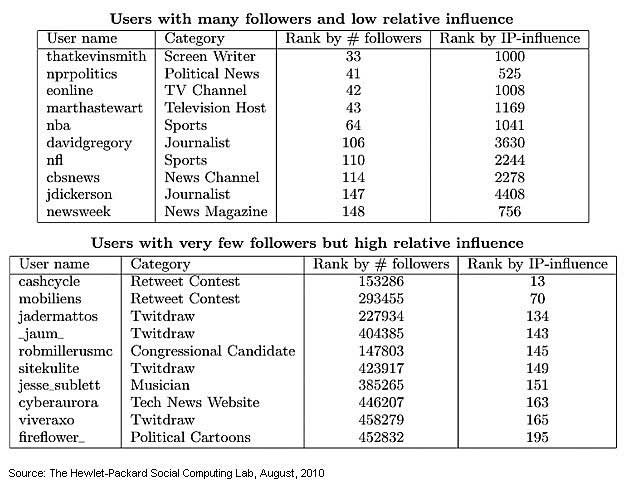Even though a Twitter user may have a large following, his or her influence on Twitter is more strongly associated with engagement rather than numbers of followers or retweets, according to new research from the Hewlett-Packard Social Computing Lab.
Because most Twitter users are passive, influence on Twitter is linked to a Twitter user's ability to motivate followers to retweet and click URLs; accordingly, the research measures "Influence-Passivity" (IP).
That metric calculates user influence based on how far a tweet travels on Twitter, taking into account the levels of passivity that those tweets encounter along the way.
IP-Influence doesn't neatly correlate with popularity. For example, among the users with the most IP-Influence is Indonesian filmmaker Joko Anwar—who ranks nearly evenly with Google in IP-influence but has a much smaller number of Twitter followers.
Below, Twitter's 10 most influential accounts, ranked by IP-Influence, with Twitter follower data as of August 9, 2010:
- @mashable: Pete Cashmore, social media blogger (2,043,680 followers)
- @jokoanwar: Joko Anwar, film director (60,440 followers)
- @google: Google News (2,362,219 followers)
- @aplusk: Ashton Kutcher, actor (5,436,442 followers)
- @syfy: Craig Engler, science fiction channel (40,995)
- @smashingmag: Vitaly Friedman, online developer magazine (228,494 followers)
- @michellemalkin: Michelle Malkin, conservative commentator (94,113 followers)
- @theonion: The Onion, news satire organization (2,306,574 followers)
- @rww: Richard MacManus, tech/social media blogger (1,038,528 followers)
- @breakingnews: Breaking News, news aggregator (1,804,192 followers)
Looking for real, hard data that can help you match social media tools and tactics to your marketing goals? The State of Social Media Marketing, a 240-page original research report from MarketingProfs, gives you the inside scoop on how 5,140 marketing pros are using social media to create winning campaigns, measure ROI, and reach audiences in new and exciting ways.
The following tables list other key online influencers' IP-Influence and popularity rankings, in contrast to those of some of the most popular Twitter accounts:

IP-Influence is a good predictor of the total number of clicks users can generate on the URLs they post, the study finds. In addition, the metric can be used for content filtering and ranking—to predict what content is most likely to receive attention based on which users mention it early on.
Though the research was based on Twitter, the IP-Influence measure is applicable to other social networks, the authors note.
About the data: Findings are based on the analysis of 22 million tweets and retweets collected during a 300-hour period beginning September 10, 2009.



